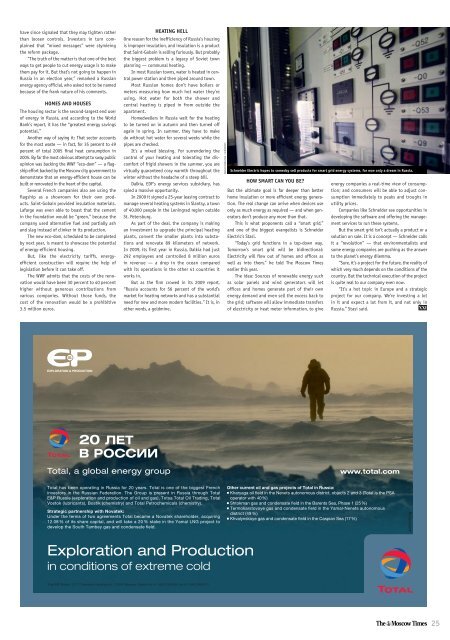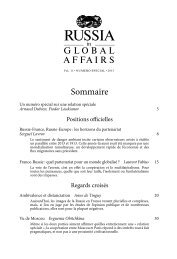said Oleg Dorin of Saint-Gobain. - CCIFR
said Oleg Dorin of Saint-Gobain. - CCIFR
said Oleg Dorin of Saint-Gobain. - CCIFR
- TAGS
- oleg
- dorin
- ccifr
- www.ccifr.ru
Create successful ePaper yourself
Turn your PDF publications into a flip-book with our unique Google optimized e-Paper software.
have since signaled that they may tighten rather<br />
than loosen controls. Investors in turn complained<br />
that “mixed messages” were stymieing<br />
the reform package.<br />
“The truth <strong>of</strong> the matter is that one <strong>of</strong> the best<br />
ways to get people to cut energy usage is to make<br />
them pay for it. But that’s not going to happen in<br />
Russia in an election year,” remarked a Russian<br />
energy agency <strong>of</strong>ficial, who asked not to be named<br />
because <strong>of</strong> the frank nature <strong>of</strong> his comments.<br />
HOMES AND HOUSES<br />
The housing sector is the second-largest end user<br />
<strong>of</strong> energy in Russia, and according to the World<br />
Bank’s report, it has the “greatest energy savings<br />
potential.”<br />
Another way <strong>of</strong> saying it: That sector accounts<br />
for the most waste — in fact, for 35 percent to 49<br />
percent <strong>of</strong> total 2005 final heat consumption in<br />
2005. By far the most obvious attempt to sway public<br />
opinion was backing the WWF “eco-dom” — a flagship<br />
effort backed by the Moscow city government to<br />
demonstrate that an energy-efficient house can be<br />
built or renovated in the heart <strong>of</strong> the capital.<br />
Several French companies also are using the<br />
flagship as a showroom for their own products.<br />
<strong>Saint</strong>-<strong>Gobain</strong> provided insulation materials.<br />
Lafarge was even able to boast that the cement<br />
in the foundation would be “green,” because the<br />
company used alternative fuel and partially ash<br />
and slag instead <strong>of</strong> clinker in its production.<br />
The new eco-dom, scheduled to be completed<br />
by next year, is meant to showcase the potential<br />
<strong>of</strong> energy-efficient housing.<br />
But, like the electricity tariffs, energyefficient<br />
construction will require the help <strong>of</strong><br />
legislation before it can take <strong>of</strong>f.<br />
The WWF admits that the costs <strong>of</strong> the renovation<br />
would have been 30 percent to 40 percent<br />
higher without generous contributions from<br />
various companies. Without those funds, the<br />
cost <strong>of</strong> the renovation would be a prohibitive<br />
3.5 million euros.<br />
HEATING HELL<br />
One reason for the inefficiency <strong>of</strong> Russia’s housing<br />
is improper insulation, and insulation is a product<br />
that <strong>Saint</strong>-<strong>Gobain</strong> is selling furiously. But probably<br />
the biggest problem is a legacy <strong>of</strong> Soviet town<br />
planning — communal heating.<br />
In most Russian towns, water is heated in central<br />
power station and then piped around town.<br />
Most Russian homes don’t have boilers or<br />
meters measuring how much hot water they’re<br />
using. Hot water for both the shower and<br />
central heating is piped in from outside the<br />
apartment.<br />
Homedwellers in Russia wait for the heating<br />
to be turned on in autumn and then turned <strong>of</strong>f<br />
again in spring. In summer, they have to make<br />
do without hot water for several weeks while the<br />
pipes are checked.<br />
It’s a mixed blessing. For surrendering the<br />
control <strong>of</strong> your heating and tolerating the discomfort<br />
<strong>of</strong> frigid showers in the summer, you are<br />
virtually guaranteed cosy warmth throughout the<br />
winter without the headache <strong>of</strong> a steep bill.<br />
Dalkia, EDF’s energy services subsidiary, has<br />
spied a massive opportunity.<br />
In 2009 it signed a 25-year leasing contract to<br />
manage several heating systems in Slantsy, a town<br />
<strong>of</strong> 40,000 people in the Leningrad region outside<br />
St. Petersburg.<br />
As part <strong>of</strong> the deal, the company is making<br />
an investment to upgrade the principal heating<br />
plants, convert the smaller plants into substations<br />
and renovate 89 kilometers <strong>of</strong> network.<br />
In 2009, its first year in Russia, Dalkia had just<br />
292 employees and controlled 8 million euros<br />
in revenue — a drop in the ocean compared<br />
with its operations in the other 41 countries it<br />
works in.<br />
But as the firm crowed in its 2009 report,<br />
“Russia accounts for 56 percent <strong>of</strong> the world’s<br />
market for heating networks and has a substantial<br />
need for new and more modern facilities.” It is, in<br />
other words, a goldmine.<br />
SERGEI NIKOLAYEV / VEDOMOSTI<br />
Schneider Electric hopes to someday sell products for smart grid energy systems, for now only a dream in Russia.<br />
HOW SMART CAN YOU BE?<br />
But the ultimate goal is far deeper than better<br />
home insulation or more efficient energy generation.<br />
The real change can arrive when devices use<br />
only as much energy as required — and when generators<br />
don’t produce any more than that.<br />
This is what proponents call a “smart grid,”<br />
and one <strong>of</strong> the biggest evangelists is Schneider<br />
Electric’s Stasi.<br />
“Today’s grid functions in a top-down way.<br />
Tomorrow’s smart grid will be bidirectional:<br />
Electricity will flow out <strong>of</strong> homes and <strong>of</strong>fices as<br />
well as into them,” he told The Moscow Times<br />
earlier this year.<br />
The idea: Sources <strong>of</strong> renewable energy such<br />
as solar panels and wind generators will let<br />
<strong>of</strong>fices and homes generate part <strong>of</strong> their own<br />
energy demand and even sell the excess back to<br />
the grid; s<strong>of</strong>tware will allow immediate transfers<br />
<strong>of</strong> electricity or heat meter information, to give<br />
energy companies a real-time view <strong>of</strong> consumption;<br />
and consumers will be able to adjust consumption<br />
immediately to peaks and troughs in<br />
utility prices.<br />
Companies like Schneider see opportunities in<br />
developing the s<strong>of</strong>tware and <strong>of</strong>fering the management<br />
services to run these systems.<br />
But the smart grid isn’t actually a product or a<br />
solution on sale. It is a concept — Schneider calls<br />
it a “revolution” — that environmentalists and<br />
some energy companies are pushing as the answer<br />
to the planet’s energy dilemma.<br />
“Sure, it’s a project for the future, the reality <strong>of</strong><br />
which very much depends on the conditions <strong>of</strong> the<br />
country. But the technical execution <strong>of</strong> the project<br />
is quite real to our company even now.<br />
“It’s a hot topic in Europe and a strategic<br />
project for our company. We’re investing a lot<br />
in it and expect a lot from it, and not only in<br />
Russia,” Stasi <strong>said</strong>.<br />
25




